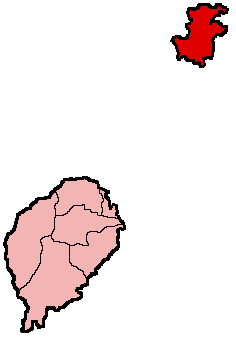Autonomous Region of Príncipe: Difference between revisions
dab |
Iridescent 2 (talk | contribs) m →History: Cleanup and typo fixing, typo(s) fixed: ’s → 's (4) |
||
| Line 69: | Line 69: | ||
== History == |
== History == |
||
{{see also|Príncipe#History}} |
{{see also|Príncipe#History}} |
||
In 1995, a few years after the |
In 1995, a few years after the country's democratic transition, Príncipe became an autonomous region. The island's first regional government was elected in the same year. The central government's failure to hold any local election in the years thereafter caused another popular protest in June 2006 that forced Príncipe's regional government to step down. |
||
==Population== |
==Population== |
||
Revision as of 17:29, 16 February 2021
Autonomous Region of Príncipe
Região Autónoma do Príncipe | |
|---|---|
Autonomous Region | |
 Map of São Tomé and Príncipe highlighting Príncipe Region near the top right corner | |
| Coordinates: 1°37′N 7°24′E / 1.617°N 7.400°E | |
| Country | |
| Capital | Santo António |
| Area | |
• Total | 142 km2 (55 sq mi) |
| Elevation | 947 m (3,107 ft) |
| Population (2018)[1] | |
• Total | 8,420 |
| • Density | 59/km2 (150/sq mi) |
| Time zone | UTC+0 |
| ISO 3166 code | ST-P |
The Autonomous Region of Príncipe (Template:Lang-pt) is an autonomous administrative division of the Republic of São Tomé and Príncipe. Established on 29 April 1995, it covers the island of Príncipe and a number of small uninhabited islands around it, with an area of 142 km2 (55 sq mi) in total.[2] As defined by the constitution of São Tomé and Príncipe, the Autonomous Region of Príncipe has a Regional Assembly and a Regional Government.[3] Its population was 7,324 at the 2012 census;[4] the latest official estimate was 8,420.[5] It consists of a single district: Pagué. Its seat is the town Santo António.
Islands
The main island of the autonomous region is Príncipe. Smaller offshore islets are:
History
In 1995, a few years after the country's democratic transition, Príncipe became an autonomous region. The island's first regional government was elected in the same year. The central government's failure to hold any local election in the years thereafter caused another popular protest in June 2006 that forced Príncipe's regional government to step down.
Population
| Year | Population |
|---|---|
| 1940[6] | |
| 1950[6] | |
| 1960[6] | |
| 1970[6] | |
| 1981[6] | |
| 1991[6] | |
| 2001[6][4] | |
| 2012[6][4] |
Settlements

The main settlement is the town of Santo António. Other settlements are:
Notable Persons
- Damião Vaz d'Almeida, a former president of the regional government of Príncipe from 1995 to 2002, and subsequently a prime minister of São Tomé and Príncipe from 2004 to 2005.
See also
References
- ^ Instituto Nacional de Estadística de São Tomé e Príncipe, as at 13 May 2018.
- ^ Cooperação Descentralizada Príncipe – Portugal: Eficiência da Existência de Redes de Cooperação (2010), Ana Maria Luciano Barreira, Universidade Técnica de Lisboa, p. 42-43
- ^ Constituição, Artigo 137.º, Assembleia Nacional de S. Tomé e Príncipe
- ^ a b c Projecção a nível distrital 2012 - 2020[permanent dead link], Instituto Nacional de Estatística
- ^ Instituto Nacional de Estadística de São Tomé e Príncipe, as at 13 May 2018.
- ^ a b c d e f g h Evolução da População Recenseada, 1940 a 2012, Instituto Nacional de Estatística


